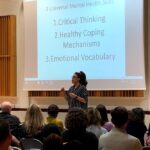On Tuesday 5 March parents joined Natasha Devon MBE to hear about how best to develop skills to promote good mental health and high esteem in girls. Natasha has been visiting the school for over five years, speaking with pupils, and now it was the turn of the parents to benefit from her expertise as a mental health ambassador.
Natasha has undertaken extensive training & consultation to allow her to present on mental health and body image, safely & responsibly. As well as spending a year working as an understudy to a therapist specialising in addiction, her qualifications include being a certified instructor for Mental Health First Aid England and for Beat (the eating disorders charity).
During the evening Natasha spoke about mental health and mental fitness – the latter term she prefers to resilience, as she sees it as something that you can work on in the same way as physical fitness. Her invaluable insight into adolescence included stories from her own experience, both personally and the journey she has had during her career plus her three top skills for positive mental health:
1 Critical Thinking
2 Healthy Coping Mechanisms
Natasha emphasised the importance of discovering coping strategies for stress – to ensure that we allow our ‘stress bucket’ valve to open and release the stresses we have accumulated. She discussed the purpose of stress and healthy ways to cope with it for example physical exercise – in contrast with a toxic coping mechanism such as self harm.
3 Emotional Vocabulary
The words we use don’t just inform our cultural understanding, but our internal belief systems. Using her research authoring A Beginner’s Guide to Being Mental, Natasha explored the inherent limitations of language for emotional communication and how parents and teachers can use language more effectively to create home and school environments conducive to emotional wellbeing.
Using her expertise – and a lot of humour – Natasha made some very salient points, not only about supporting children’s mental health but also about parents taking time to recharge and maintain their own mental fitness.





